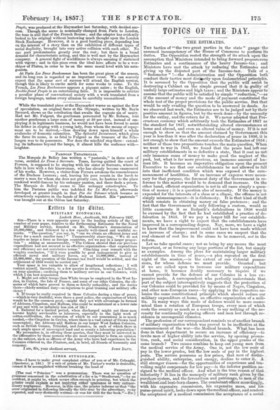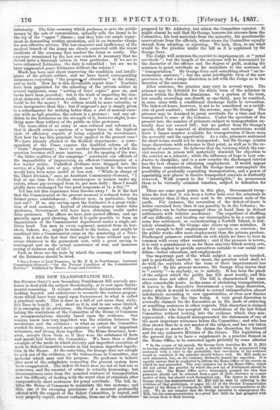TOPICS OF THE DAY.
THE ESTIMATES.
THE tactics of "the two great parties in the state" gauge theassumed incompetency of the House of Commons to perform its duties. The Opposition rested the strength of its attack upon the assumption that Ministers intended to bring forward preposterous Estimates and a continuance of the heavy Income-tax ; and Ministers have met the attack by reducing the Estimates and giving up the disPuted part of the Income-tax. Talk of a " foolometer " !—the Administration and the Opposition both conduct their tactics most distinctly upon foolometrical principles. It is assumed by the Opposition that the public will assist in destroying a Cabinet on the simple ground that it is guilty of unduly large estimates and high taxes ; and the Ministers appear to assume that the public will be satisfied by simple "reduction,"—as if the amount of money and the mode of payment constituted the whole test of the proper provisions for the public service. But that would be only evading the question to be answered in deeds. As we observed last week, the Estimates are to be judged not by their positive amount in figures, but by the work done—by the necessity
or the outlay, and the return for it. We never adopted that Procrustean economy which arbitrarily took the Estimates of 1837 as the standard for 1857, notwithstanding altered circumstances at home and abroad, and even an altered value of money. If it is not enough to show us that the amount claimed by Government this year is less than it was after the declaration of peace in 1856, it is not enough to show that the amount exceeds the Estimates of 1854; neither of those two propositions touches the main question. When we went to war in 1855, we found that the peace had left ourmilitary establishments in so defective a state, that it cost us not only immense sums of money to snake good the neglect of the past, but, what is far more precious, an immense amount of human life. It becomes an imperative obligation upon the present Executive to see that our establishments be not allowed to fall into that inefficient condition which was exposed at the commencement of hostilities. If an increase of expense were necessary for that purpose, the foremost duty of the Government in reference to this matter would be to demand that increase. On the other hand, efficient organization is not in all cases simply a question of money ; it is a question also of necessity. If the money is expended for the interests of a class or a clique, the offence is not simply mismanagement—it is dishonesty. It is that kind of theft which consists in obtaining money on false pretences ; and the fact that the Government is only following a custom, would as little exonerate it as Redpath's defalcations in 1856 would be excused by the fact that he had established a practice of defalcation in 1855. If we pay a larger bill for our establishments, we have a right to expect that the establishments have improved in a corresponding degree. Nay, more, we have a right to know that the improvement could not have been made without an increase of charge ; and in some cases we suspect that the real element of cost lies in the abuse to be removed, not in the reform.
Let us take special oases ; not as being by any means the most important, or as forming any large portions of the list, but simply as examples. Among the pleas for maintaining larger military establishments in time of peace,—a plea repeated on the first night of the session,—is the extent of our Colonial posses sions, for whose defense we must provide. Granted ; but if we arc called upon to increase our military expenditure at home, it becomes doubly necessary to inquire if we cannot provide for the defence of our Colonies in a less expensive mode. A correspondent who perfectly understands that part of the subject interrogatively suggests that the protection of our Colonies could be provided for by means of Negro, Cingalese, and other non-European races—by applying to the respective colonies the same constitutional principle which should reduce our military expenditure at home, an effective organization of a militia. In many ways this mode of defence would be more economical than a rotation of European troops, every man of which costs the country as much as a convict, to say nothing of the necessity for continually replacing officers and men lost through residence in uncongenial climates. The profession of our correspondent reminds us of another branch of military organization which was proved to be ineffective at the commencement of the war—the Medical branch. What has been done in that department to secure an increase of efficiency—to invite men of higher ability into the service, by opening promo tion, rank, and social consideration, in the upper grades of the same branch ? Two causes combine to keep out young men from the medical service of the Army. One is, not the low scale of pay in the lower grades, but die low scale of pay in the highest posts. The service possesses so few prizes, that men of distinguished ability, enterprise, and energy, decline to enter it. A
still stronger reason—for the opportunities of experience and tra velling might compensate for low pay—is the inferior position assigned to the medical officer. And what is the true reason of that
inferiority ? It lies in the monopoly of military rank given by the
purchase system, and the favouritism and patro e, to men of the wealthiest and best-born classes. The combatant 0 leer accordingly,
with his expensive cammission, his expensive mess, and his purse-proud spirit, looks down upon the medical officer, and renders the acceptance of a medical commission the acceptance of a social
inferiority. The false economy which professes to save the public money by the sale of commissions, aetually sells the Army to be the toy of the " upper " classes ; and they take out ample repayment in demanding routine promotion and in an immense charge for non-effective service. The low character and inefficiency of the medical branch of the Army are closely connected with the worst incidents of the economy that renders the Army so costly. The exposure occasioned by the last war renders it necessary that we should have a thorough reform in that particular. If we are to have enhanced Estimates the duty is redoubled ; but are we to have augmented peace Estimates without the reform ?
Much has been said about improving the condition and intelligence of the private soldier, and we have heard corresponding assurances respecting "the progresbaf education" in the Army, and so forth. How far is this favourable report true ? Teachers have been appointed for the schooling of the private soldier in several regiments, some "setting of boys' copies" goes on, and books have been provided ; but is the work of imparting the simplest elements of education really done ? is it done as well as it could be for the money ? No reform would be more valuable, or more inexpensive than this • but if sergeant's pay is simply given to a schoolmaster for nothing better than a sort of manual exercise with no ball practice, the reform is a pretence ; and any addition to the Estimates on the strength of it, however slight, is nothing more than robbery of the public on false pretences. The beau-ideal of an army at once reduced and reformed is, that it should retain a nucleus of a larger force in the highest state of efficiency capable of being expanded by recruitment. Now how far has this principle been applied in the present case ? We have already alluded to the Medical department ; a correspondent of the Times exposes the doubtful reform of the "Train" department; there is another department in which the question becomes still more anxious. At the opening of the war,
the bitter realities of the campaign" convinced our officials of the impossibility of improvising an efficient Commissariat at a few weeks' notice. Undrilled civilians were dragged into the service at a high rate of pay, when men trained to the service would have been more useful at less cost. "While in charge of the Third Division,", says an Assistant Commissary-General, "I had at one time five civilian storekeepers or issuers under my orders, whose pay averaged from 5s. per man daily ; these I would gladly have exchanged for two good sergeants at is. a day."*
Yet has not this experience been thrown away ? Is it the fact that the Commissariat at the present moment is reduced below its former peace establishment ; efficient men, in particular, being cast out ? If so, any saving upon the Estimates is a gross violation of real economy. Instead of obtaining money under false kretenees, Government will have been obtaining credit under false pretences. The officer we have just quoted affirms, and apparently upon good showing, that it is quite possible to form an organization of the Commissariat department under a single military head. Ten men in every regiment, manned from its butchers, bakers &c might be trained to the duties, and might be combined into a Commissariat corps on the mustering of a Division. Is it not the feet that, this might be done without any increase whatever to the permanent cost, with a great saving to contingent cost on the actual occurrence of war, and immense saving of sickness and of life ? Such as these are the tests by which the economy and honesty of the Estimates should be tried.
* See a Letter to Lord Panmure, by Mr. E. B. de Fonblanque, Assistant Commissary-General—" On the Present Condition of the Commissariat Service." Published by Messrs. Yonge and Ciichton.



























 Previous page
Previous page